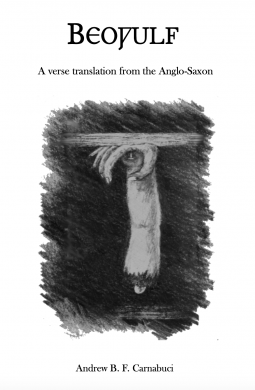
Beowulf
A Verse Translation from the Anglo-Saxon
by Andrew B. F. Carnabuci
This title was previously available on NetGalley and is now archived.
Send NetGalley books directly to your Kindle or Kindle app
1
To read on a Kindle or Kindle app, please add kindle@netgalley.com as an approved email address to receive files in your Amazon account. Click here for step-by-step instructions.
2
Also find your Kindle email address within your Amazon account, and enter it here.
Pub Date 15 Feb 2021 | Archive Date 1 Oct 2021
Talking about this book? Use #Beowulf #NetGalley. More hashtag tips!
Description
Gæð a wyrd swa hio scel! Beowulf is the classic Old English heroic-elegiac poem, presented here in a new verse translation. The poem follows the rise and fall of its titular hero on adventures in Denmark in his youth, and facing a dragon as the King of Geatland in his old age.
This edition is fully annotated throughout, and includes a translator's preface and introduction, pedigree diagrams for the major royal houses, and a full bibliography.
If you have never experienced the Anglo-Saxon world of savage violence, stark beauty, and deeply-felt sorrow--or if you are looking for a fresh new alliterative verse translation--you will find here one of the finest foundational epic poems of the English-speaking world.
Advance Praise
"""In short, this new translation will remind readers of the joy of taking something known and reevaluating it once more; not to bend it to our modern view but in fact to reclaim its truth and present the modern reader with a raw and honest translation of a legend which has irrevocably shaped storytelling."" (★★★★★ Stars, a""Must Read"") --Kristiana Reed, DISCOVERY (Mar. 19, 2021)
""This new verse translation is both poignant and powerful. Carnabuci demonstrates a subtle interpretive pen, a deep reverence for the original text, and a penchant for poetic pacing that makes this latest version a pleasure to read."" (★★★★ Stars) --SELF-PUBLISHING REVIEW (Mar. 9, 2021)
""Readers will be rewarded with a translation that brings the poetry back to this archaic masterpiece."" (4.5/5; ""IndieReader Approved"") --Christina Doka, INDIE READER (April 7, 2021)
""Magnificent and breathtaking... Carnabuci adeptly blends engrossing storytelling with seamless description and expert worldbuilding, and his tidy, engaging verses offer fresh perspectives on Beowulf both as a warrior and as a human. Staying true to the Anglo-Saxon language it was written in during the eighth century, Carnabuci effortlessly preserves the originality of the work, giving the elegiac narrative of the great Scandinavian hero a fresh and compelling reality for contemporary readers. Lovers of epic poetry will be bewitched."" --PRAIRIES BOOK REVIEW (Feb. 14, 2021).
""Beowulf: A Verse Translation from the Anglo-Saxon should be a foundation piece in any collection strong in early Anglo-Saxon history, culture, and language, with its powerful new series of observations and insights backed by extensive footnote references. Not only does the preface explore the history of the piece and the cultural flavours that Anglo-Saxon heritage imparted, but it explores the roots of Anglo-Saxon literary representations, studies, and the fallacies and inherent prejudices in scholarly approaches to the piece. By explaining the translator's challenges and approach to the artificiality of the language, Carnabuci provides invaluable insights into a translator's tasks and options. These explanations and this book should be part of any reasoned consideration of Beowulf studies."" --Diane Donovan, MIDWEST BOOK REVIEW (Jul. 2021 issue)"
Available Editions
| ISBN | 9798733169064 |
| PRICE | $2.99 (USD) |
Links
Average rating from 10 members
Featured Reviews
Just to be clear: Beowulf is not a 'I like to read it for the story' kind of book. It is an 'I appreciate its translation and the historical and literary implications of this' kind of book though. And I did appreciate the translation and the choices the translator made a lot. Including the foreword where some of those choices are explained.
 Reviewer 499835
Reviewer 499835
This lovely self-published Beowulf is the fourth translation I've read in the last few years (the others are translations by Chickering, Heaney, and bro-loving Maria Dahvana Headley) and wow, I loved it. The author is unabashedly, unapologetically erudite in his preface, quoting Aristotle in the original Greek and introducing me to a lovely new word, "sphalm," which I've since learned "is an archaic and largely obsolete word that refers to a 'bad idea', most often a misinterpretation of a religious text." Yeah. What a great word. So let me get to the poem itself and why I loved this translation. It's completely clear. It follows the story and yet it somehow keeps a great deal of the art of the original poem, with its kennings and its alliterative flourishes. It gripped me and reminded me that this is a great story. It's not as fussily self-important as Heaney or as flashy as Headley or as stodgily precise as Chickering and as far as I'm concerned that's all to the good. I enjoyed reading this version a great deal--it was like visiting with an old friend and seeing new qualities I hadn't seen before.
It's clear on every page that Carnabuci loves the language of the poem, and loves the story of the poem, in a way that I'll never have access to, unless I spend the next many years of my life learning old English. I'm grateful to feel the translator's enthusiasm for the poem through these pages. The preface alone is worth reading a few times.
Having studied Beowulf and Medieval writings in University, I was interested in this interpretation of the piece. I enjoyed this book and found the translation to be highly accurate and an excellent example of this period . It is very accessible to anyone and I recommend it for the lay reader as well as the student. My thanks go to Netgalley, the publishers and the Author for the privilege of an ARC.




